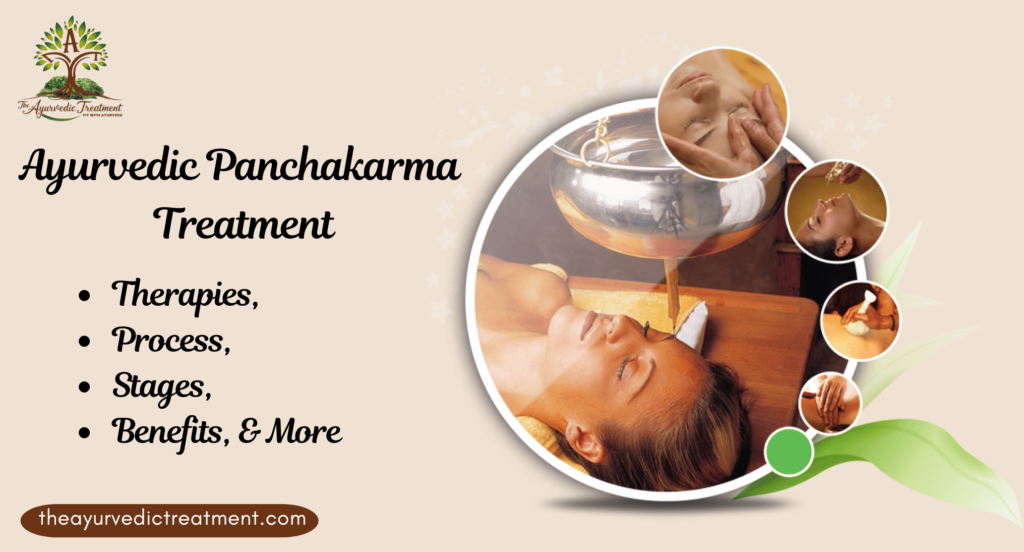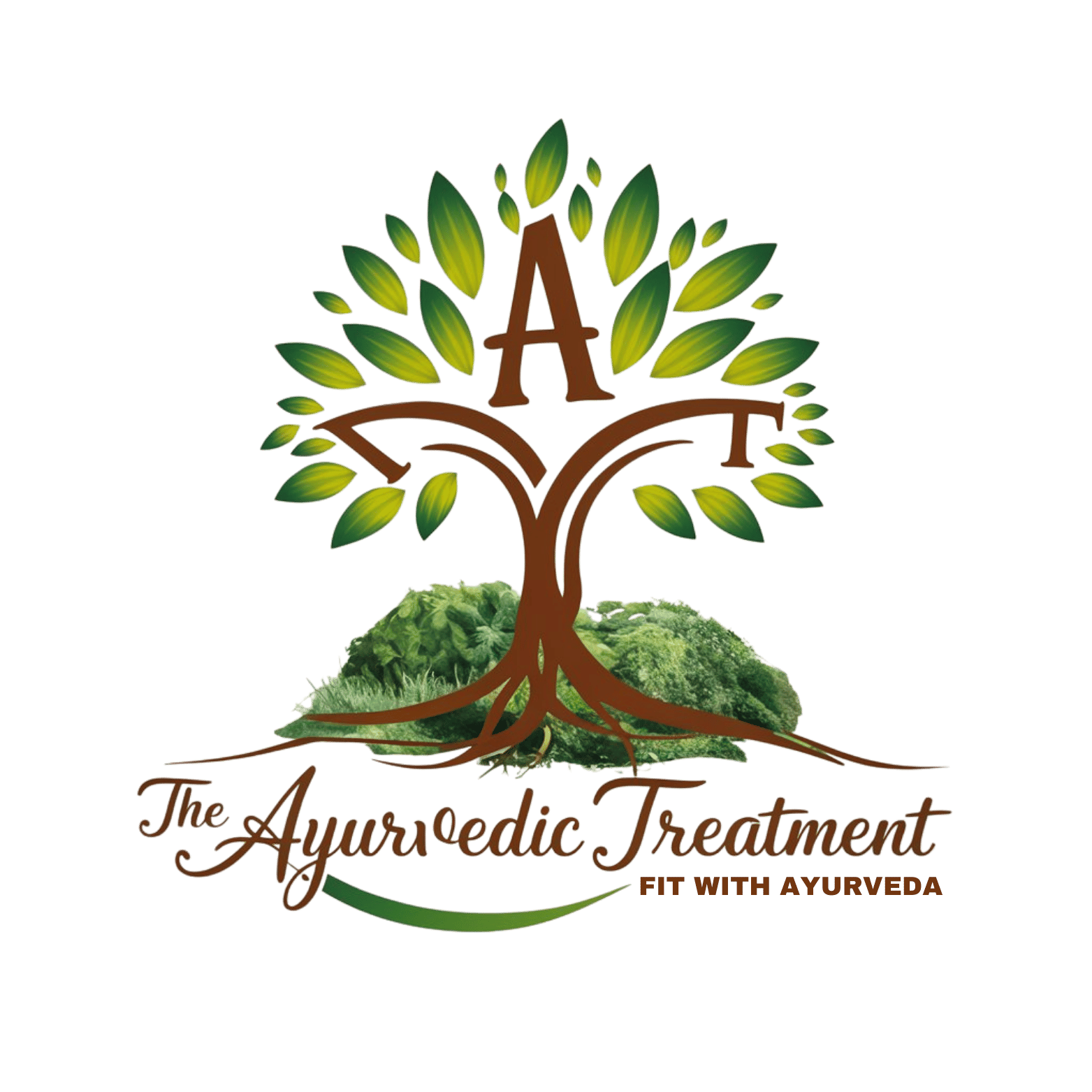
Ayurvedic Panchakarma Treatment or Therapy: It is a comprehensive detoxification method that employs medicated oils to expel impurities from the body. It epitomizes Ayurvedic principles, focusing on restoring balance and health.
The term “Panchakarma” translates to “Five Actions,” aptly describing the five foundational processes it encompasses: Vomiting (Vamana), Purgation (Virechana), Basti (enema therapy), Nasya (nasal administration), and Raktamokshana (bloodletting). These actions are designed to cleanse and rejuvenate the body, making Panchakarma a vital component of Ayurvedic therapy.
You May Like Also: What is Ayurveda
What is Ayurvedic Panchakarma Treatment?
Ayurvedic Panchakarma treatment is a comprehensive detoxification and rejuvenation therapy within Ayurveda, designed to cleanse the body of toxins and restore balance. “Panchakarma” translates to “Five Actions,” encompassing five key therapies:
- Vamana (therapeutic vomiting)
- Virechana (purgation)
- Basti (enema therapy)
- Nasya (nasal administration)
- Raktamokshana (bloodletting)
These therapies target various bodily imbalances related to the three Ayurveda doshas (Vata, Pitta, Kapha) and are performed under the guidance of an Ayurvedic practitioner.
Read Also: Ayurveda Doshas
The treatment process involves three stages:
- preparation (Purvakarma)
- main treatment (Pradhanakarma)
- post-treatment (Paschatkarma).
Benefits include thorough detoxification, enhanced digestion, improved immunity, increased energy, and mental clarity. Panchakarma is tailored to individual health needs and is considered a powerful method for achieving holistic health and well-being.
Five Actions or Therapies of Ayurvedic Panchakarma Treatment
Vamana (Therapeutic Emesis)
This is one of the therapies of Ayurvedic Panchakarma Treatment. This process involves induced vomiting to eliminate toxins from the stomach and respiratory tract. It is particularly beneficial for Kapha-related disorders such as asthma, bronchitis, and sinus issues.
Virechana (Purgation)
This therapy uses herbal laxatives to cleanse the intestines, effectively removing Pitta-related toxins. It is recommended for conditions like jaundice, colitis, and other digestive ailments.
Basti (Enema Therapy)
Considered highly effective for Vata disorders, Basti involves administering medicated oils or herbal decoctions via enema. It addresses chronic conditions such as arthritis, constipation, and neurological disorders.
Nasya (Nasal Administration)
This treatment involves the administration of herbal oils or powders through the nose, targeting ailments of the head and neck. Nasya Therapy of Ayurvedic Panchakarma Treatment is effective for treating migraines, sinusitis, and mental health conditions.
Raktamokshana (Bloodletting)
This procedure purifies the blood and is used to treat diseases caused by impure blood, such as skin disorders (psoriasis, eczema) and localized infections.
The Process of Panchakarma Treatment
Ayurvedic Panchakarma Treatment is typically divided into three phases:
1. Purvakarma (Preparation Phase):
- Oleation: Application of medicated oils to the body (internally and externally) to loosen toxins.
- Swedana (Fomentation): Induced sweating to further soften tissues and mobilize toxins for elimination.
2. Pradhanakarma (Main Treatment Phase):
The five main actions (Vamana, Virechana, Basti, Nasya, and Raktamokshana) are performed based on the individual’s health needs and specific imbalances.
3. Paschatkarma (Post-Treatment Phase):
- Diet and Lifestyle Modifications: A prescribed diet and lifestyle regimen to support the body’s rejuvenation and maintain the benefits of the detoxification process.
- Rejuvenation Therapies: Use of Rasayana (rejuvenating medicines) to enhance vitality and immunity.
Read Also: Ayurvedic Definition of Health
Benefits of Ayurvedic Panchakarma Treatment
Ayurvedic Panchakarma treatment offers numerous benefits, contributing to overall health and well-being. The treatment not only rejuvenates the body but also fosters mental clarity and emotional balance, contributing to an overall sense of vitality.
Here we have listed some key advantages:
- Comprehensive Detoxification: Panchakarma effectively removes accumulated toxins (Ama) from the body, promoting internal cleansing.
- Enhanced Digestion: By strengthening the digestive fire (Agni), improves metabolism and nutrient absorption.
- Weight Management: Helps in reducing excess weight by eliminating impurities and balancing bodily functions.
- Boosted Immunity: Strengthens the immune system, making the body more resilient to diseases.
- Increased Energy Levels: Ayurvedic Panchakarma Treatment restores vitality and energy, combating fatigue and lethargy.
- Mental Clarity and Emotional Balance: Reduces stress, anxiety, and mental fog, promoting emotional well-being.
- Improved Skin Health: Purifies the blood, resulting in clearer, healthier skin.
- Joint and Muscle Health: Alleviates pain and inflammation, enhancing mobility and flexibility.
- Rejuvenation of Tissues: Promotes tissue regeneration and overall rejuvenation, slowing down the aging process.
- Holistic Healing: Addresses the root causes of imbalances, fostering long-term health and harmony in mind, body, and spirit.
Ayurvedic Panchakarma Treatment addresses the root causes of imbalances, ensuring long-term health and harmony. Embracing Panchakarma can lead to a revitalized life, marked by improved physical health, mental peace, and emotional well-being.
Why Should One Undergo Panchakarma Therapy?
Ayurvedic Panchakarma Treatment or Therapy is a vital aspect of Ayurvedic medicine, offering numerous benefits for those seeking holistic health and wellness.
Here are key reasons to consider undergoing Panchakarma therapy:
1. Thorough Detoxification: Modern lifestyles often lead to the buildup of toxins due to poor diet, pollution, and stress. Panchakarma provides a comprehensive detox, effectively cleansing the body of these harmful substances and restoring internal balance.
2. Improved Digestion and Metabolism: Panchakarma enhances the digestive system by strengthening Agni (digestive fire), which improves nutrient absorption and metabolism. This is crucial for maintaining optimal health and preventing digestive disorders.
3. Disease Prevention and Management: By addressing the root causes of imbalance, Panchakarma helps prevent diseases and manage chronic conditions. It works by balancing the doshas (Vata, Pitta, and Kapha), which are fundamental in Ayurveda for maintaining health.
4. Rejuvenation and Anti-Aging: Beyond detoxification, Ayurvedic Panchakarma Treatment rejuvenates the body’s tissues, promoting cellular regeneration and slowing the aging process. This leads to increased vitality and longevity.
5. Mental Clarity and Emotional Balance: Ayurvedic Panchakarma Treatment includes practices that reduce stress and anxiety, fostering mental clarity and emotional stability. The holistic approach helps in achieving a calm and balanced state of mind.
6. Enhanced Immunity: By eliminating toxins and improving bodily functions, Panchakarma boosts the immune system, making the body more resilient to infections and diseases.
7. Holistic Health Benefits: Panchakarma treats the body, mind, and spirit, ensuring that all aspects of an individual’s well-being are addressed. This holistic healing approach leads to a balanced and harmonious life.
8. Customized Treatment: Each Panchakarma program is personalized according to an individual’s constitution (Prakriti) and current health conditions (Vikriti), ensuring the therapy is effective and specific to one’s needs.
9. Relief from Chronic Ailments: Ayurvedic Panchakarma Treatment is particularly beneficial for chronic conditions such as arthritis, digestive issues, respiratory problems, and skin disorders. It offers a natural way to manage and alleviate these ailments.
In summary, Panchakarma therapy offers a natural and holistic approach to detoxifying the body, enhancing digestion, boosting immunity, and promoting overall well-being. By addressing the root causes of health issues and restoring balance, Panchakarma paves the way for a healthier and more vibrant life.
Read Also: Ayurveda and Disease
What Can I Expect from Ayurvedic Panchakarma Treatment?
Embarking on Ayurvedic Panchakarma Treatment journey offers a transformative experience that rejuvenates the body, mind, and spirit. Here’s what you can expect from undergoing this traditional Ayurvedic detoxification and rejuvenation process:
- Initial Consultation and Assessment: The process begins with a thorough evaluation by an experienced Ayurvedic practitioner. This assessment involves understanding your unique constitution (Prakriti), current health status (Vikriti), and specific imbalances. Based on this, a personalized Panchakarma plan is designed to address your individual needs.
- Preparation Phase (Purvakarma): Before the main Panchakarma treatments, you’ll undergo preparatory procedures to loosen and mobilize toxins. This phase typically includes:
- Oleation (Snehana): The application of medicated oils internally and externally to lubricate the body and prepare it for detoxification.
- Fomentation (Swedana): Induced sweating through steam or heat treatments to further soften tissues and promote toxin release.
- Main Treatment Phase (Pradhanakarma): This phase of Ayurvedic Panchakarma Treatment consists of the five primary Panchakarma therapies, each targeting different areas of the body and types of toxins:
- Vamana (Therapeutic Emesis): Induced vomiting to clear the upper digestive tract and respiratory system of toxins.
- Virechana (Purgation): The use of herbal laxatives to cleanse the intestines and remove Pitta-related toxins.
- Basti (Enema Therapy): Administration of medicated enemas to detoxify the colon and manage Vata-related conditions.
- Nasya (Nasal Administration): Nasal drops of medicated oils or powders to clear the nasal passages and head region.
- Raktamokshana (Bloodletting): A procedure to purify the blood, often used for treating skin disorders and conditions caused by impure blood.
- Post-Treatment Phase (Paschatkarma): Following the main therapies, you’ll undergo a rejuvenation period to restore balance and maintain the benefits of the detoxification. This phase includes:
- Diet and Lifestyle Guidance: A tailored diet and lifestyle plan to support your body’s healing and prevent the recurrence of toxins.
- Rejuvenation Therapies (Rasayana): Use of herbal preparations and tonics to rejuvenate the body, strengthen immunity, and promote overall vitality.
- Holistic Benefits and Changes: Throughout the Ayurvedic Panchakarma Treatment process, you may experience various changes and benefits, such as:
- Physical Detoxification: Noticeable elimination of toxins, resulting in a feeling of lightness and increased energy.
- Enhanced Digestion: Improved digestive function and metabolism, leading to better nutrient absorption and weight management.
- Mental Clarity and Emotional Balance: Reduced stress and anxiety, with a clearer, more focused mind and balanced emotions.
- Improved Immunity: Strengthened immune response, making you more resistant to illnesses and infections.
- Overall Rejuvenation: A sense of renewal and vitality, with improved skin health, joint flexibility, and overall well-being.
- Potential Healing Crisis: It’s not uncommon to experience a “healing crisis” during Panchakarma, where symptoms may temporarily worsen as toxins are released. This is a natural part of the detoxification process and usually indicates that the therapy is working effectively.
Ayurvedic Panchakarma Treatment: Conclusion
In conclusion, Ayurvedic Panchakarma Treatment offers a comprehensive and personalized approach to detoxification and rejuvenation. By undergoing this traditional Ayurvedic treatment, you can expect to cleanse your body of toxins, enhance your overall health, and experience a renewed sense of well-being.
Through personalized care and a deep understanding of individual needs, Panchakarma addresses the root causes of imbalances, ensuring long-term health and harmony. Embracing Panchakarma can lead to a revitalized life, marked by improved physical health, mental peace, and emotional well-being.
Disclaimer: Ayurvedic Panchakarma Treatment should be performed under experienced Ayurvedic doctors and trained practitioners.
Read Other Blogs:

